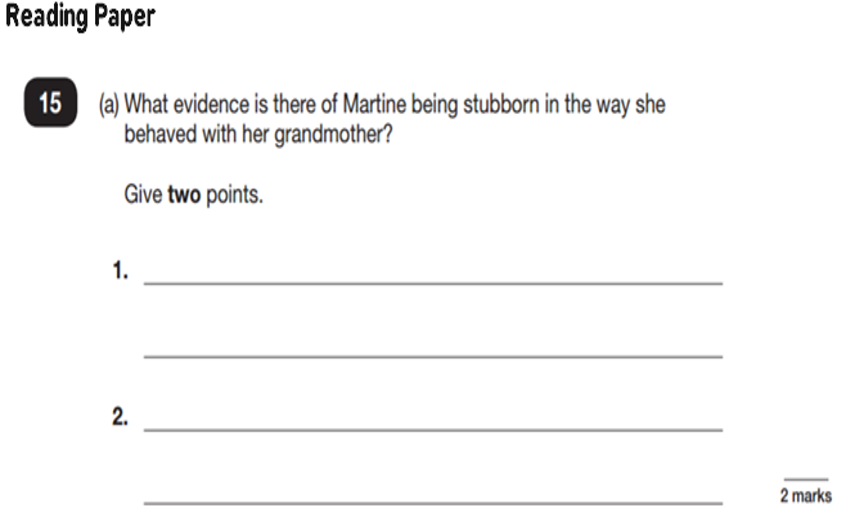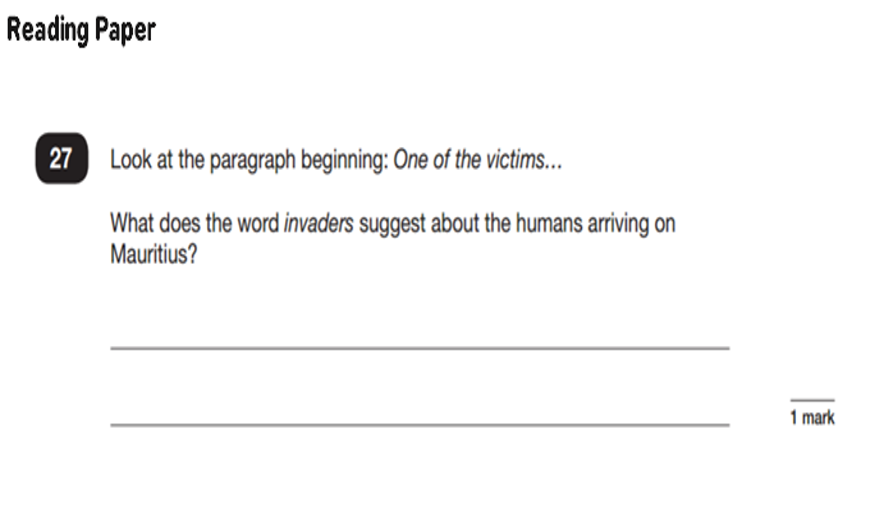English SATs (Y6)
Reading Test
The reading test consists of a single test paper with three unrelated reading texts. Children are given 60 minutes in total, which includes reading the texts and answering the questions.
A total of 50 marks are available.
Questions are designed to assess the comprehension and understanding of a child’s reading.
Reading Skills tested include:
- Inference and deduction
- Author’s language choices
- Text Structure
Some questions are multiple choice or selected response; others require short answers and some require an extended response or explanation.
Example Questions


20% of the marks in this year’s Reading paper were awarded for Vocabulary/Meanings of words in context questions.
IDIOMS
We take it for granted that various common sayings are understood by our pupils but it is worth checking this …… you might be surprised by the idioms they are not familiar with. Some really do "pull their socks up"!
Grammar and Punctuation Test
- A spelling test is administered containing 20 words, which lasts approximately 15 minutes.
- A separate test is given on grammar, punctuation and vocabulary.
- This test lasts for 45 minutes and requires short answer questions including some multiple choice.
- Marks for these two tests are added together to give a total for grammar, punctuation and spelling.
Areas to be tested will include:
- Word classes – nouns, adjectives, adverbs, determiners etc.
- Features of sentences – statements, commands, questions
- Complex sentences – clauses, subordinating and co-ordinating conjunctions
- Standard English – tenses, I and me, contractions, subject and verb agreement (e.g. We were …)
- Tenses will include: past, present, future, perfect and progressive
- Vocabulary – synonyms, antonyms, word meanings, prefixes and suffixes, singular and plural words
- Punctuation – capital letters, commas, inverted commas, apostrophes, ellipsis, colons etc.
The KS2 SATs are attempting to measure if each student has met the year 6 expectation.
Helping with Reading
Read a range of non-fiction and fiction texts – identify the features of the texts.
Listen to your child read – use the reading records. Ask questions about their reading – use SPaG book questions (front of SPaG books).
Find different types of texts in your home. Talk about WHO they are written for / WHY they have been written / WHAT style has been used / WHEN the text style is used / WHERE these texts are found / HOW the texts have been organised.
Encourage your child to point out the vocabulary and punctuation used by the author. Ask what effects these have and what they can infer from the author’s use of language.
Writing
Pupils’ writing will be assessed during the course of the year. Their work will be assessed in other curriculum subjects as well as English. This will be moderated internally, by other local schools and quite possibly by an external moderator.
The range of styles include:
- Narrative, Poetry, Recount, Report, Instruction, Procedure, Explanation, Persuasion, Argument.
- Grammar, punctuation and vocabulary will all be assessed through pupils’ writing.
Spelling
20 sentences with words to fill in:
- Freya is ..... when she is playing netball. (happiest)
- Rashid wanted to ..... his top score. (double)
- The plants .....butterflies. (attracted)
- The dancers’ movements were .....(synchronised)
- Previous years’ spellings have included:
- tough system international difference
- frequent occasion potential assistant
How to help...
- Post-its
- Spelling rules
- Go through SPaG book spellings.
- Learn the spellings in the back of the SPaG books.
- The final page lists words that all pupils should be able to spell by the end of year 6.
- Point out spellings around the house / in shops / on outings.
- When listening to your child read, point out certain spellings.
- Reading records – write down spellings of new words / learn the meaning of these words.
- Note words and their spellings in the context of the sentences.
